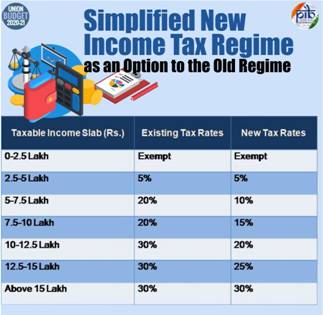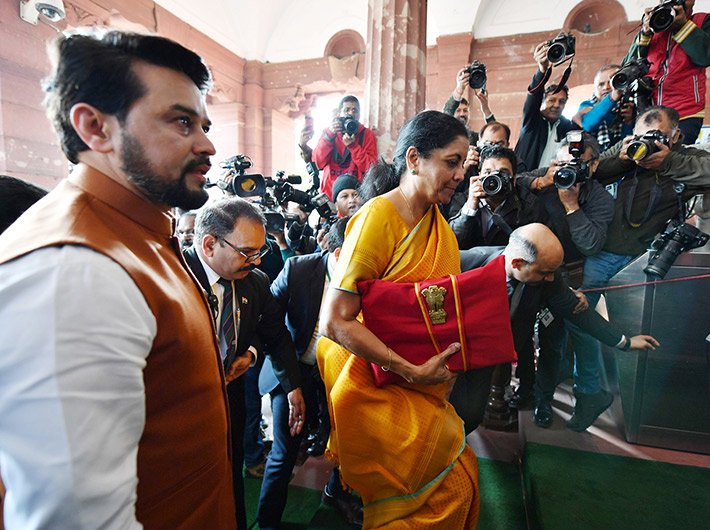Finance minister Nirmala Sitharaman presented the union budget for 2020-21 on Friday, providing significant relief in particular to middle-class taxpayers. Here are the main proposals related to taxation:
Direct Tax
Direct Tax Proposals - To stimulate growth, simplify tax structure, bring ease of compliance, and reduce litigations
Personal Income Tax: Significant relief to middle class taxpayers. New and simplified personal income tax regime proposed:

* Around 70 of the existing exemptions and deductions (more than 100) to be removed in the new simplified regime.
* Remaining exemptions and deductions to be reviewed and rationalised in coming years.
* New tax regime to be optional - an individual may continue to pay tax as per the old regime and avail deductions and exemptions.
* Measures to pre-fill the income tax return initiated so that an individual who opts for the new regime gets pre-filled income tax returns and would need no assistance from an expert to pay income tax.
* New regime to entail estimated revenue forgone of Rs. 40,000 crore per year.
Corporate Tax:
Tax rate of 15% extended to new electricity generation companies.
Indian corporate tax rates now amongst the lowest in the world.
Dividend Distribution Tax (DDT):
DDT removed making India a more attractive investment destination.
Deduction to be allowed for dividend received by holding company from its subsidiary.
Rs. 25,000 crore estimated annual revenue forgone.
Start-ups:
Start-ups with turnover up to Rs. 100 crore to enjoy 100% deduction for 3 consecutive assessment years out of 10 years.
Tax payment on ESOPs deferred.
MSMEs to boost less-cash economy:
Turnover threshold for audit increased to Rs. 5 crore from Rs. 1 crore for businesses carrying out less than 5% business transactions in cash.
Cooperatives:
Parity brought between cooperatives and corporate sector.
Option to cooperative societies to be taxed at 22% + 10% surcharge and 4% cess with no exemption/deductions.
Cooperative societies exempted from Alternate Minimum Tax (AMT) just like Companies are exempted from the Minimum Alternate Tax (MAT).
Tax concession for foreign investments:
100% tax exemption to the interest, dividend and capital gains income on investment made in infrastructure and priority sectors before 31st March, 2024 with a minimum lock-in period of 3 years by the Sovereign Wealth Fund of foreign governments.
Affordable housing:
Additional deduction up to Rs. 1.5 lakhs for interest paid on loans taken for an affordable house extended till 31st March, 2021.
Date of approval of affordable housing projects for availing tax holiday on profits earned by developers extended till 31st March, 2021.
Tax Facilitation Measures
Instant PAN to be allotted online through Aadhaar.
‘Vivad Se Vishwas’ scheme, with a deadline of 30th June, 2020, to reduce litigations in direct taxes:
Waiver of interest and penalty - only disputed taxes to be paid for payments till 31st March, 2020.
Additional amount to be paid if availed after 31st March, 2020.
Benefits to taxpayers in whose cases appeals are pending at any level.
Faceless appeals to be enabled by amending the Income Tax Act.
For charity institutions:
Pre-filling in return through information of donations furnished by the done.
Process of registration to be made completely electronic.
Unique registration number (URN) to be issued to all new and existing charity institutions.
Provisional registration to be allowed for new charity institutions for three years.
CBDT to adopt a Taxpayers’ Charter.
Losses of merged banks:
Amendments proposed to the Income-tax Act to ensure that entities benefit from unabsorbed losses and depreciation of the amalgamating entities.
Indirect Tax
GST:
Cash reward system envisaged to incentivise customers to seek invoice.
Simplified return with features like SMS based filing for nil return and improved input tax credit flow to be implemented from 1st April, 2020 as a pilot run.
Dynamic QR-code capturing GST parameters proposed for consumer invoices.
Electronic invoice to capture critical information in a centralized system to be implemented in a phased manner.
Aadhaar based verification of taxpayers being introduced to weed out dummy or non-existent units.
GST rate structure being deliberated to address inverted duty structure.
Customs Duties:
Customs duty raised on footwear to 35% from 25% and on furniture goods to 25% from 20%.
Basic customs duty on imports of news print and light-weight coated paper reduced from 10% to 5%.
Customs duty rates revised on electric vehicles and parts of mobiles.
5% health cess to be imposed on the imports of medical devices, except those exempt from BCD.
Lower customs duty on certain inputs and raw materials like fuse, chemicals, and plastics.
Higher customs duty on certain goods like auto-parts, chemicals, etc. which are also being made domestically.
Trade Policy Measures
Customs Act being amended to enable proper checks of imports under FTAs.
Rules of Origin requirements to be reviewed for certain sensitive items.
Provisions relating to safeguard duties to be strengthened to enable regulating such surge in imports in a systematic way.
Provisions for checking dumping of goods and imports of subsidized goods being strengthened.
Suggestions for reviews of exemptions from customs duty to be crowd-sourced.
Excise duty proposed to be raised on Cigarettes and other tobacco products, no change made in the duty rates of bidis.
Anti-dumping duty on PTA abolished to benefit the textile sector.


